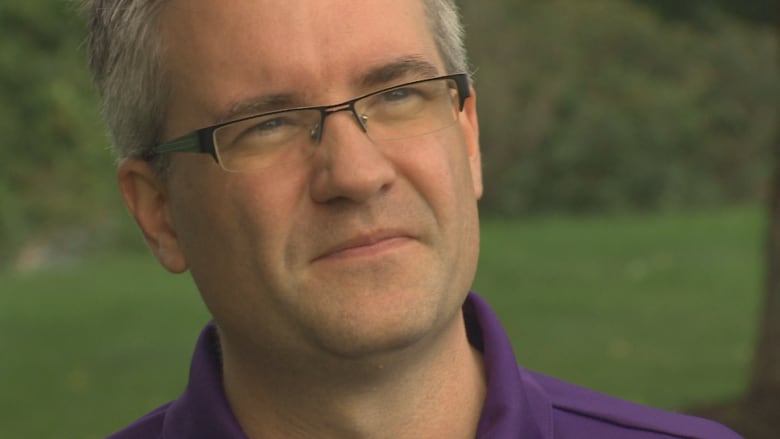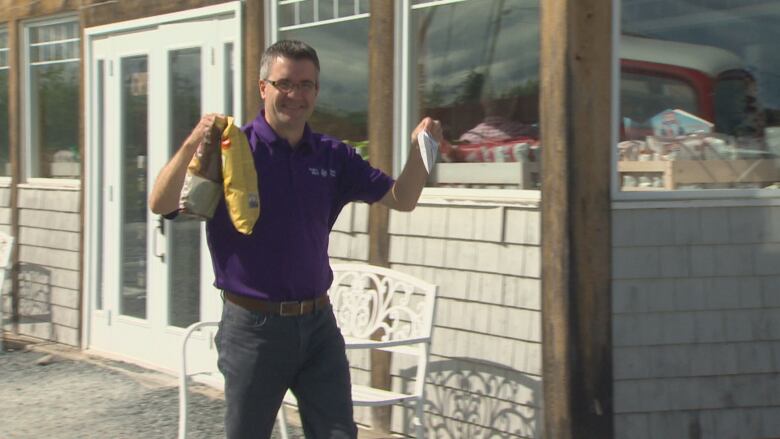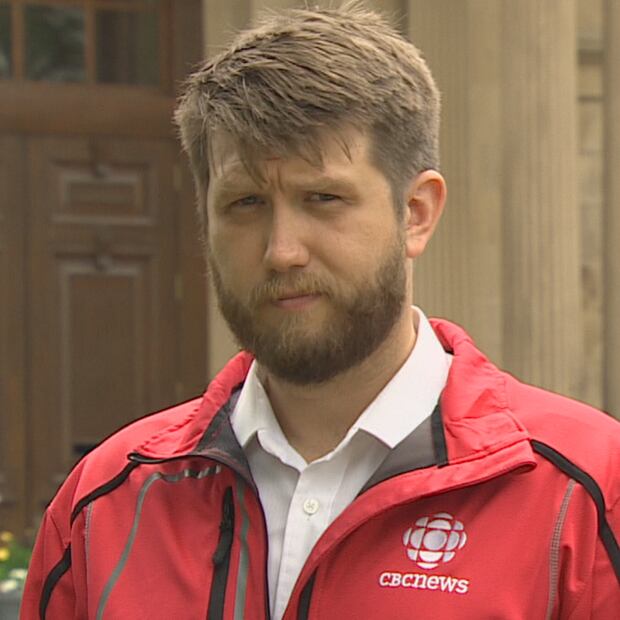Chips, booze and lumber: A whirlwind trip with Kris Austin
People's Alliance Leader Kris Austin attracts some supporters looking for 'common sense'

Trailing Kris Austin on a day of campaigning is much like travelling without a destination.
There are many, many stops in unexpected places. Not a whole lot is planned. And there is lots of buying of things you didn't know you needed.
Austin's tour of the Upper St. John River Valley on Thursday was mostly dictated by the whims of the local candidates he met with along the way.
"From head office in Fredericton we don't dictate where they go and we don't do a whole lot of, you know, marketing apparatus around things," said Austin.

A lumber mill, a potato chip plant, a cabinet factory, and a "moonshine" distillery were a few of stops as the People's Alliance "campaign bus," a Dodge Caravan, wrapped in purple campaign decals declaring "Be the Change!" bounced from place to place.
Arranging to meet Austin along his route proved a bit of challenge, like hitting a moving target. His communications manager suggested the most direct method: "text him."
Journalists often have to navigate layers of communications officers, emails and calls before accessing other party leaders. Just texting is refreshingly simple.
And that mantra of "common sense" is one that isn't lost on those who pledge their allegiance to the former church minister from Minto.

That text leads to a call, which leads to the Covered Bridge Potato Chip Company in Waterville. Once there, it's not hard to pinpoint who's with the People's Alliance of New Brunswick. One purple shirt greets another before Austin and Stewart Manuel, the candidate for the riding of Carleton, take the potato chip tour.
As potatoes are sorted, diced and cooked in oil in the background, the two men speak at length with company president Ryan Albright about challenges facing small businesses, lowering taxes, and the quality of life in the Maritimes, all while chowing down on a bag of chips.
Austin makes his arguments for a change in government, shakes hands and buys a few more bags "for the road."
He crosses the street to Moonshine Creek, a distillery of grain spirits. (The term "moonshine" isn't legally recognized in Canada, so the term moonshine is used with a wink.)
Here Austin repeats the process, touring the plant, then voicing his displeasure with bureaucracy to owner Jeremiah Clark. He criticizes the various taxes faced by local brewers and distillers, vows to move the sale of alcohol to private companies and convenience stores, reducing the Crown corporation to a regulatory body, and promises a flat tax.

Austin shakes hands, buys a jar of apple crumble-flavoured definitely-not-moonshine moonshine — wink-wink — and heads to his next stop, wherever that might be.
He promises he's not a heavy drinker.
A promise of different
For the last eight years, Austin has promised he can do better than either the Liberals or the PCs, two sides of the same coin as far as he's concerned. And that promise is what has brought some people into politics, although many shrug off the label of "politician."
"I was sitting around complaining about the government so I decided to jump in," said Manuel, who also bought jar of not-moonshine.
Manuel is one of 30 candidates running for the People's Alliance and one of many who have no law-making or political experience. After working with CN Rail for 35 years, Manuel describes himself as a guy who, when it comes down to it, just "wants his road fixed."

"The roads are terrible," Manuel said. "People, they buy a new vehicle and they beat the front end off on potholes. And they're just sick of it, really.
"They're just bad everywhere and they hate paying taxes and having nothing to show for it."
But like most of those new to the purple party, Manuel points to Austin himself for recruiting him.
"I looked at the Green Party and the People's Alliance, and I picked the People's Alliance," said Manuel.
"People's Alliance to me was the better party. Just the way Kris would talk to you. And his interviews. It's just a common-sense party, basically."
Austin and Manuel wish each other luck and part ways. Off to meet the candidate farther north, Austin disappears just long enough to sneak some Burger King, before he's shaking hands with the next purple shirt in front of the Victoria Glen Manor in Perth-Andover.
Perth-Andover
Terry Sisson, a retired school teacher and former Hockey NB board member heads into the manor, where it seems every second person knows his name.
The question "How are you doing, Terry?" is often met with the lightning response of "Terrible! How are you?" with a chuckle and a friendly smile. He's a character and he knows it. But so does the community, and the well-known 75-year old is well-liked.
He's quick to poke fun of himself, but when questioned about the issues he's campaigning on, he becomes sombre.
"We're not retaining our youth here," said Sisson.
Over the years, he said, he's watched hockey clubs shrink to the point where it's difficult to keep a team going. The community has been aging, and families with children are few and far between.
"I'm probably a little over the average age, but not by much."
He got sad saying that only two homes have sold over the last five years.
"I drive up through here and I can see more empty houses and signs with "For Sale" on them and I know that the people aren't going to sell them. Nobody is buying around here. Nobody is coming back here."
But Austin gives him hope for a change in the way things have been run in the province. Like many in the party, he sees no tangible differences in a community when New Brunswick is run by the PCs or the Liberals. In Austin, he sees something different.
"I like Kris. He's honest. Straightforward. No beating around the bush. What he says you can take to the bank."
Sisson sees the major issues as jobs and population decline, while his fellow candidate just down the river points to infrastructure and services being the number one issue. They echo a similar sentiment on at least two things: their leader and language.
Rally time

Five o'clock rolls around and by this time, Austin has visited close to a dozen businesses and shops throughout the day.
This culminates in Nackawic, where about 50 supporters — all wearing purple — gather under the "World's Biggest Axe" for a barbecue and a meet-and-greet rally. Potatoes are once again sliced and cooked in oil, and an acoustic guitar solo act plays in the background.
Here, once again, the local candidate describes his decision to run as the result of Austin's perceived sincerity.

"He sold me," said Gary Lemmon, a retired carpenter running for Carlton-York. "His message was so clear and so honest. And he came across so honest. And I listened to his plan, his policies. And I thought "this was somebody that I could follow," you know, 'I like what you're telling me.'
'He's talking about change, he's talking about a voice for the people and that was a new thing," said Lemmon.
And Lemmon, like the others who have donned the purple shirt, thinks that if New Brunswick were in better shape it could afford duality, the offering of separate services in French and in English. But not in this economy.
Language barriers
The divisive issue of language brings a lot of these candidates together. Each insists there is no deep-seated agenda against the francophone community.
Rather, it's the costs that come with being Canada's only bilingual province. And in a province strapped for cash the idea of "paying double" doesn't jive with the "common sense" mantra.

Forgetting for a minute the constitutional protection of both official languages, it's the commonly held belief that there's a mountain of money to be saved by abolishing duality.
The example touted most often is the image of two half-full school buses making the same early-morning rounds, picking up English and French children separately. The "double costs" don't make "common sense," when your targeted base is anglophones in the southern half of the province.
And it's rallying points like this one that have been growing the purple party to the point where there is a very real chance Austin will get a seat in the legislature this fall.
Asked if his platform is racist, or anti-French, he is quick to rebuff.
"That's just nonsense," said Austin, who concedes that the issues surrounding language are the biggest criticism his party faces from the general public.
"Language is always a hot button for us, but just because it's a sensitive issue doesn't mean we should shy away from it politically," said Austin.
"Matter of fact, because it is such a hot issue I think it's something politicians should talk more about. And of course, the debate should be respectful, and we have to find solutions in New Brunswick. We can't just continue to shy away from them because they're sensitive topics."
Supporters at the rally also disagree their calls for an end to dual services should be seen as anything more than "common sense."

"It makes me laugh in a way," said Bo Sheaves, who lives in Nackawic and makes 40-minute drive to Fredericton each way daily to work at a grocery store. "First it made me a little bit angry. Now I just chuckle at it because it's the furthest thing. I'm half-French, my mother was a Levesque from the Grand Falls area.
"I would never be against the French people … I would never be supporting any party that was anti-French. … I would never support a party that was against the French population in this province. Or anything that would have anything to do with anti-French. I wouldn't be supporting the party."
For Sheaves, as every candidate Austin met with during the day, the language issue boils down to dollars and cents they say the province doesn't have.
Countdown to the 24th
Austin talks with people as he eats chips and hotdogs, it hasn't been the healthiest road diet, he admits.
But he's convinced it will all be worth it.
Four years ago, Austin lost his home riding of Fredericton-Grand Lake by 26 votes (25, said Austin, after the recount.) Since then he's seen his party ranks swell, he said.
Memberships and candidates are about double what they were last provincial election.
The latest projections from the CBC Poll Tracker suggest the People's Alliance of New Brunswick could get a single seat and 6.6 per cent of the popular vote. That's not far off from the NDP's 7.3 per cent or the Greens' 8.1 per cent.
"My argument has always been that two parties operate so much the same there's no differential opinions, or ideas, or policies, between them," Austin said. "So we want to take a different approach and it's nice to see that people of New Brunswick are finally catching onto that."

